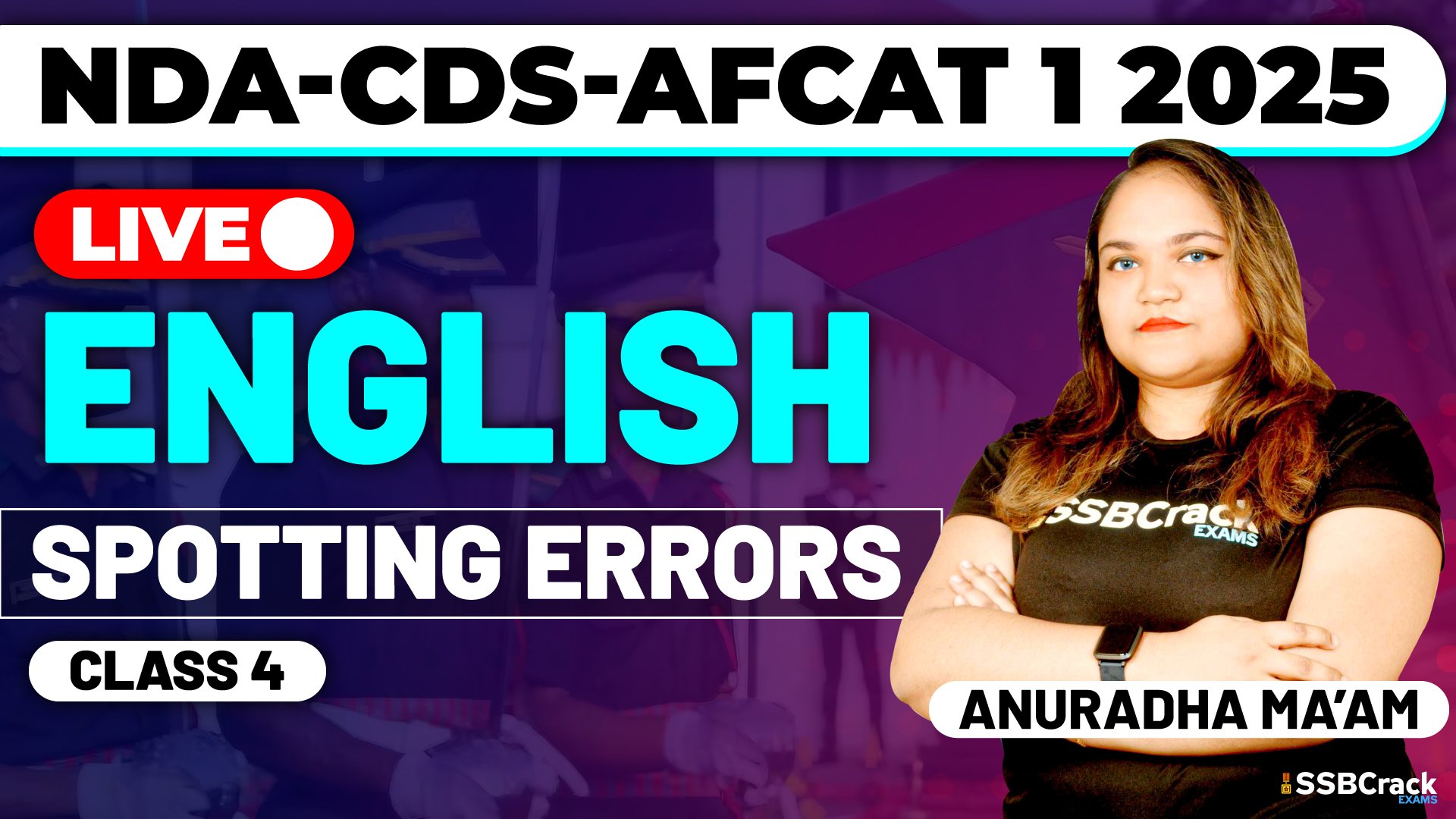Spotting Errors is one of the fundamental topics tested in the English section of the NDA, CDS, and AFCAT exams. It evaluates a candidate’s grasp of grammar, vocabulary, and sentence structure, making it crucial for anyone aiming to secure a high score in these competitive exams. Understanding the nuances of English grammar is vital to solving Spotting Errors questions, as they test knowledge across a wide range of grammatical rules.
Why Spotting Errors is Important
- Frequent and Consistent Appearance: In NDA, CDS, and AFCAT exams, the Spotting Errors topic is a constant. Several questions from this topic regularly appear in the English section, making it one of the most predictable and important areas to focus on.
- Grammar-Focused: The core of Spotting Errors questions is grammar. Candidates must have a thorough understanding of various grammatical concepts, including parts of speech (nouns, pronouns, verbs, adjectives, etc.), tenses, subject-verb agreement, articles, prepositions, and more. Without a solid foundation in grammar, it becomes challenging to detect errors effectively.
- Evaluating Accuracy: Spotting Errors questions require attention to detail and an analytical mindset. In this section, candidates are tested on their ability to spot even the smallest of mistakes in sentences, which may range from misplaced modifiers to incorrect verb forms.
- Builds Confidence in Sentence Formation: Solving Spotting Errors questions enhances a candidate’s confidence in writing and understanding correct sentence structures. This skill is beneficial not only for clearing exams but also for effective communication.
Key Concepts to Master for Spotting Errors
- Parts of Speech: A deep understanding of nouns, pronouns, verbs, adjectives, adverbs, prepositions, conjunctions, and interjections is essential. Knowing how these elements function in a sentence will help in identifying errors related to their usage.
- Grammar Rules: Candidates should be familiar with subject-verb agreement, correct usage of tenses, sentence fragments, run-on sentences, and parallelism. These rules frequently appear in the Spotting Errors questions, and mastering them is essential for success.
- Punctuation and Sentence Structure: Misplaced commas, colons, and semicolons can drastically alter the meaning of a sentence. Punctuation errors, along with sentence structure issues such as misplaced modifiers or improper word order, are common in this section.
Class Sessions on Spotting Errors
In Spotting Errors Class 4, I conducted an MCQ session where candidates solved important questions from this topic. These sessions were designed to give students a real-time experience of how such questions are framed in the actual exams. Practicing multiple-choice questions (MCQs) helps candidates fine-tune their grammar knowledge and improve their speed and accuracy, both of which are critical during exams.
Directions: Each item in this section has a sentence with three parts labelled as (a), (b) and (c). Read each sentence to find out whether there is any error in any underlined part and indicate your response on the Answer Sheet against the corresponding letter i.e., (a) or (b) or (c). If you find no error, your response should be indicated as (d).
Q) I’ve been trying (A) / to catch you as (B) / you left college. (C) No error (D)
Ans. B
Q) I wish you (A) / can hear (B) / yourself talking. (C) / No error (D)
Ans. B
Q) Three lakhs of people (A) / attended the workshop (B) / held in Ramleela ground. (C) / No error (D)
Ans. A
Q) I’ll never be marrying (A) / anyone, but (B) / will be a dancer. (C) / No error (D)
Ans. A
Q) Grandfather along (A) / with the children (B) / have gone to Chennai. (C) / No error (D)
And. C
For more questions, check out NDA-CDS-AFCAT 1 2025 Exam English Live – Spotting Errors – Class 4
Tips for Solving Spotting Errors Questions
- Read the Sentence Carefully: Ensure you read the entire sentence before identifying the error. Sometimes, the mistake is subtle and requires careful analysis.
- Focus on Tenses and Agreement: Subject-verb agreement and tense-related errors are common in this section, so pay special attention to them.
- Eliminate Options: If you can’t find the error initially, try eliminating the options you know are correct. This will narrow down your choices.
- Revise Grammar Rules: Regular revision of grammar rules is key to mastering Spotting Errors. Focus on revising essential topics like articles, prepositions, and conjunctions, which frequently appear.
Conclusion
The Spotting Errors topic is a critical component of the English section in NDA, CDS, and AFCAT 1 2025 exams. With a thorough understanding of grammar rules, parts of speech, and sentence structure, candidates can effectively tackle these questions. Regular practice, especially through MCQ sessions like the ones conducted in Spotting Errors Class 4, will ensure that candidates are well-prepared to spot and correct errors with confidence.







